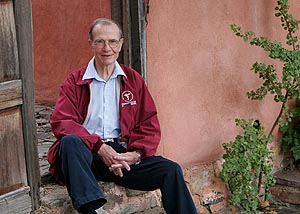Fitness Pioneer Remains Active
 |
| Medical school alumnus and fitness researcher Dr. Ralph Paffenbarger remains involved in the College Alumni Health Study he began in 1960. |
Today few people question the health benefits of regular physical activity, but there was a time when this sentiment wasn’t entirely embraced by physicians and other health care professionals let alone the general public.
“The medical and scientific community thought little of exercise as a factor in the endpoints of disease for a long time in this country,” explains Ralph S. Paffenbarger Jr., MD ’47, DrPH. “While we have known from the time of Hippocrates that exercise was good for you, fun, and appropriate, many physicians only focused on blood pressure, blood lipids, or body weight when it came to heart disease.”
In the late 1950s, Dr. Paffenbarger began investigating the influence of physical activity on the prevention of cardiovascular and other chronic diseases such as diabetes, obesity, selected cancers, and neurological diseases. Setting out to demonstrate the role of fitness on health, this Northwestern alumnus launched the landmark College Alumni Health Study in 1960.
This epidemiological study tracked the health, exercise habits, and lifestyle patterns of 71,044 graduates of Harvard College and the University of Pennsylvania. The study drew subjects from a pool of students who entered college between 1916 and 1950 and followed them through their youthful adult to golden years. Early on Dr. Paffenbarger’s groundbreaking research revealed what many fitness experts already suspected: regular vigorous exercise—burning at least 2,000 calories a week—could reduce the risk of coronary heart disease, enhance general well being, and add years to life.
While the College Study findings gave exercise “as good medicine” some credibility in the health arena, Dr. Paffenbarger went on to bolster his research by documenting the influence of physical activity in other populations. Looking at a group of people of what he called “the opposite social order” from the Harvard alums, he started studying longshoremen who worked the docks in California.
These workers obtained the same range of physical activity as the college alumni not by going to the gym or playing team sports but through back-breaking manual labor. Both studies ultimately provided Dr. Paffenbarger and his colleagues with important information that earned them honors including Olympic medals. In 1996 the International Olympic Committee (IOC) awarded Dr. Paffenbarger and Jeremy N. Morris, MD, PhD, of the London School of Hygiene and Tropical Medicine at the University of London, England, the first IOC Olympic Prize for showing the value of physical activity in fighting heart disease. The two men—one a marathon and ultra-marathon runner and the other a swimmer—”fittingly” received their medals at the 1996 Olympic Games in Atlanta.
A native of Columbus, Ohio, Dr. Paffenbarger never dreamed that he would one day become a prize-winning Olympian as well as the recipient of two Northwestern awards: the University’s Alumni Association honored him with the Alumni Merit Award in 1993 and the medical school, the Distinguished Alumni Award in 2001. After graduating from the medical school and completing a rotating internship at Evanston Hospital, he became a commissioned officer in the U.S. Public Health Service (PHS). He served in the PHS for some 20 years before retiring at the rank of medical director. In 1954 he earned his DrPH degree in epidemiology from Johns Hopkins University’s School of Hygiene and Public Health.
“I never practiced medicine in the traditional sense. I didn’t make house calls or see patients,” shares Dr. Paffenbarger, emeritus professor of epidemiology at Stanford University, adjunct professor of epidemiology at Harvard University, and research epidemiologist at the University of California at Berkeley. “In some ways, I missed a lot of the physician experience, but there are only so many things you can do.”
Indeed, time with family and friends, exercise, and work continue to keep Dr. Paffenbarger at age 83 quite busy. The father of six with his late wife Mary, Dr. Paffenbarger and spouse Jo Ann moved in August from Berkeley to Santa Fe, New Mexico, where they plan to build a house. Still attending professional conferences and publishing, he remains involved with the College Study. Today the study follows the health of the 25,000 living alumni, who participate primarily via self-administered questionnaires.
“This work has been special, mainly because all of my colleagues and friends think it is fun to be involved in physical activity research,” says Dr. Paffenbarger. “I’d like to think that this work continues to be important. There is still so much more to be done.”






